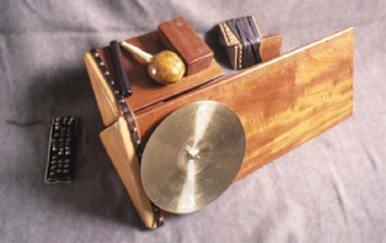Growing up in this era, even though I didn't live in New York City and visited it only sporadically, I knew about Moondog. Everyone did. The giant bearded street musician, who wore a viking helmet and carried a spear He was a New York character, one who stood out even in a city full of eight million stories and at least a few thousand eccentrics.
As a devotee and somewhat serious student of rock and roll (I was turned down for a faculty grant in 1965 to do a study of doo-wop, surely the first such request they had ever gotten), I knew that Alan Freed had called himself Moondog when he began playing rhythm and blues music on the radio in Cleveland, but had had to change it when he arrived in New York, home of the real and original Moondog. That's when Freed began calling the music he played rock 'n roll.
But I never knew anything about Moondog's music.
Alan Freed did. He had taken the name from an early 78 RPM recording called "Moondog Symphony," one of Moondog's first.
It was a curious choice in every way. It was a symphony of percussion: Drums, maracas, claves, gourds, hollow log, Chinese block and cymbals. All Moondog. And there wasn't much in the way of multitracking for a self-made 78 in 1949, so he invented his own system, working back and forth between two tape recorders.
It was curious that Freed found it at all. The record only sold a few hundred copies.
It was perhaps even more curious that he liked it, and used it as the theme song for a radio show playing black rhythm and blues for white teenagers. One might have expected that a swing-era cat like Freed would have chosen a Gene Krupa recording as theme music, but Moondog's was as far from swing as could be imagined. He called it snaketime music: "a slithery rhythm, in times that are not ordinary ... I'm not gonna die in 4/4 time."
I knew that Freed had had to stop using Moondog's name. I didn't know that he had taken Freed to court, and that the case had gone all the way to the New York State Supreme Court. Moondog himself later said that the courts would most likely have ruled against a Viking-accoutred street person, had not Benny Goodman and Arturo Toscanini testified to his importance as a composer.
I didn't know lots of other things. That his real name was Louis Hardin, that he was related to the old Western gunslinger John Wesley Hardin, that he had gone blind at age 16, that he had married a socially prominent older woman in Arkansas but had left her to come to New York, live on the street and make music.
Mostly, I didn't know his music. I had never listened to it until encountering it as the next step in my
Prestige journey. And a surprising step it was. My general policy has been not to look ahead, preferring to take the music as it comes. So where did Moondog fit into Bob Weinstock's universe?
It's hard to say. There don't seem to exist any interviews with Weinstock where he discusses this particular choice, but actually there's more of Moondog on Prestige than anywhere else, and these recordings capture an important part of his oeuvre. He had actually recorded for a jazz label once before--Woody Herman's short-lived Mars label.
The music amazed me. I'm a fan of the avant-garde music of the mid- and late-twentieth century: Terry Riley, LaMonte Young, Pauline Oliveros, Gavin Bryars. And Moondog is one of the finest avant-garde composers I have ever heard.
As other avant-garde composers have done, and as was certainly appropriate for a street musician, he used a lot of ambient sound. There's the Queen Elizabeth in the harbor, its "deep-throated whistle" blending with, and extended by, Moondog's bamboo pipe. There's the horn of a tugboat, as eerily melodic as the songs of the humpbacked whale that would become popular a generation or so later, blended into an almost, but not exactly orchestral blend of instruments. And the sounds move away from the street, too. Moondog was married for a second time in 1952, to a Japanese-American woman named Suzuko Whiteing, so he wasn't entirely homeless, though he still lived, by choice, mostly on the streets. "Lullabye" combines the cries of their six-week-old baby with Suzuko singing (or chanting) a lullabye in what I guess is Japanese, and music by a sextet composed in something like a pentatonic Japanese scale.
 |
| The trimba |
Moondog also experimented with a wide variety of instruments, many of his own invention. He was particularly drawn to the oo, a triangular-shaped 25-string harp struck with a clava. He also created a variety of percussion instruments, and percussion played an important part in his compositions. His music was always rhythmic, but rhythmic in his own way, with the slithery snaketime rhythms. On Oo Debut," a short piece (as were most of his compositions), he simultaneously played the oo and the trimba, a triangular drum that is still used by musicians today.
The "and other" musicians that are mentioned in the session notes are also varied. Sometimes he worked alone, sometimes with a quintet or sextet. Most of the compositions are quite short, "Surf Session" being the exception at nearly seven minutes.
The first album sold respectably--enough for Moondog to buy property upstate near Owego, which became his retreat from the city. Probably its sales were due to its novelty value, as there isn't much of a market for serious avant garde music. The second two -- there would be one more -- did not do so well.
Order Listening to Prestige, Vol. 1 here.





No comments:
Post a Comment